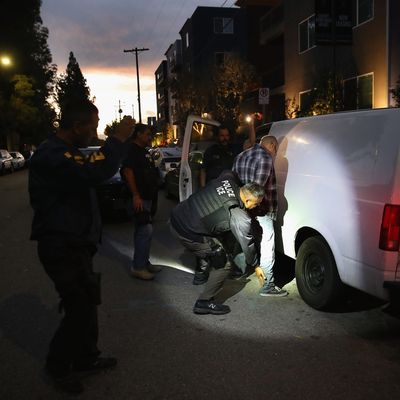
On Tuesday, the Los Angeles Times published a story about an ICE raid in Southern California. Calls for the agency’s disbandment have failed to disrupt its daily operations, which normally entail playing foot soldier for President Trump’s immigrant detention and deportation machine. But the U.S. debut of the novel coronavirus has occasioned new precautions. The ICE officials shadowed by the Times greeted each other with elbow bumps rather than handshakes. Some had N95 respirator masks stashed in their vehicles.
They gathered outside a Starbucks in Bell Gardens to arrest four people who lived in the surrounding neighborhood. Their targets would be found in varying states of surprise — leaving home to collect metal for cash, driving to early shifts. The previous weekend, California governor Gavin Newsom and L.A. mayor Eric Garcetti had advised residents to practice severe social distancing to curb the virus’s spread. But ICE insisted that this did not apply to them. “Asking us to stop doing [this] basically gives those criminals another opportunity to maybe commit more crimes, to create more victims,” David Marin, the director of Enforcement and Removal Operations for ICE in L.A., told the Times.
ICE has long operated with an inflated sense of its own importance. Available data suggests that immigrants are no more likely to commit crimes than native-born Americans, and some researchers have observed that they do so at lower rates. Influxes of undocumented people into cities and neighborhoods routinely fail to produce upticks in crime. The targets of the raids documented by the Times weren’t even suspected of recent criminal acts; their shared transgression was having been convicted sometime before — one for drunk driving, one for possession of stolen goods — and thus forever subject to removal.
But where the agency’s public-safety merits are dubious, its cachet as a terror generator is unparalleled. The stasi-like deftness with which ICE officials make entire communities feel like they’re always on the verge of rupture is clear in the documentary evidence that’s circulated in earnest since Trump took office: videos of fathers getting snatched away from the children they were dropping off at school; reports of agents arresting people at hospitals when they’re seeking medical care, in defiance of their own putative rules. This has been the case regardless of who’s in office. Presidents Obama and George W. Bush each set records for the number of people deported by a single presidential administration. But building your brand on fear and broken trust makes it hard to believe you when you promise to relent. ICE’s ability to instill terror may have earned it the favor of several presidents. But it’s dangerous to everyone in a pandemic.
The agency made such a promise on Wednesday. In a letter to Congress, ICE notified lawmakers that it will “delay enforcement actions” and use “alternatives to detention” during the coronavirus outbreak, according to the Washington Post. The sole exceptions will be “foreign nationals who have committed crimes or who pose a threat to public safety” — categories both broad and vaguely defined enough to give the agency tremendous leeway in how they’ll be enforced. More from the letter, via the Post:
During the COVID-19 crisis, ICE will not carry out enforcement operations at or near health care facilities, such as hospitals, doctors’ offices, accredited health clinics, and emergent or urgent care facilities, except in the most extraordinary of circumstances. Individuals should not avoid seeking medical care because they fear civil immigration enforcement.
The idea is that slowing down arrests and deportations will encourage more people to seek medical help, should they need it. This will be a crucial public-health measure if the government ever scales up testing enough to track the virus’s spread. It also has the benefit of limiting unnecessary social interactions. ICE agents moving in and out of people’s homes and places of work, shuffling them in and out of courtrooms and detention facilities — all are ideal vectors for transporting pathogens. Avoiding this will be at a premium as America’s prisons, jails, and immigrant detention centers brace for catastrophe. A mumps outbreak at detention centers in Texas last year and in 2018 vivify how seamlessly correctional facilities act as petri dishes for illness. Filthy and overcrowded conditions paired with minimal access to soap and water, and usually none to hand sanitizer, render inmates especially at risk for falling ill. We’ll know soon. The coronavirus is already present in New York’s jails and prisons. Advocate calls to decarcerate are intensifying by the day.
And so far, there’s been some movement. According to the Post, ICE prosecutors and immigration attorneys recently asked the Justice Department to close its immigration courts temporarily; as of Tuesday night, hearings beyond those for people already detained had been canceled. But whether or not Wednesday’s letter marks an earnest effort on ICE’s part, the agency has given the public no grounds on which to trust it. Its very function is predicated on capturing people when they’re at their most vulnerable and unsuspecting. The instinct to evade their machinations, honed in American immigrant communities across generations, is not so easily shed. They’ve made it their business to keep people afraid and under duress, and by extension away from hospitals and cycling in and out of detention. With the coronavirus wreaking its havoc, the potential public-health fallout is more of a danger to Americans than many that ICE claims to be protecting us from.
We’re committed to keeping our readers informed.
We’ve removed our paywall from essential coronavirus news stories. Become a subscriber to support our journalists. Subscribe now.






























